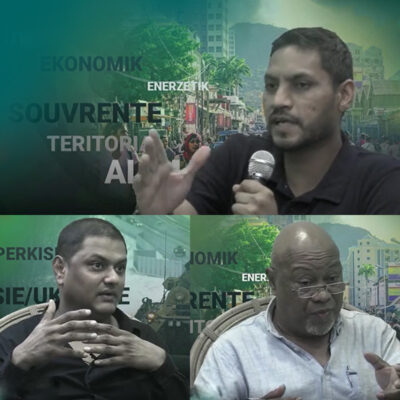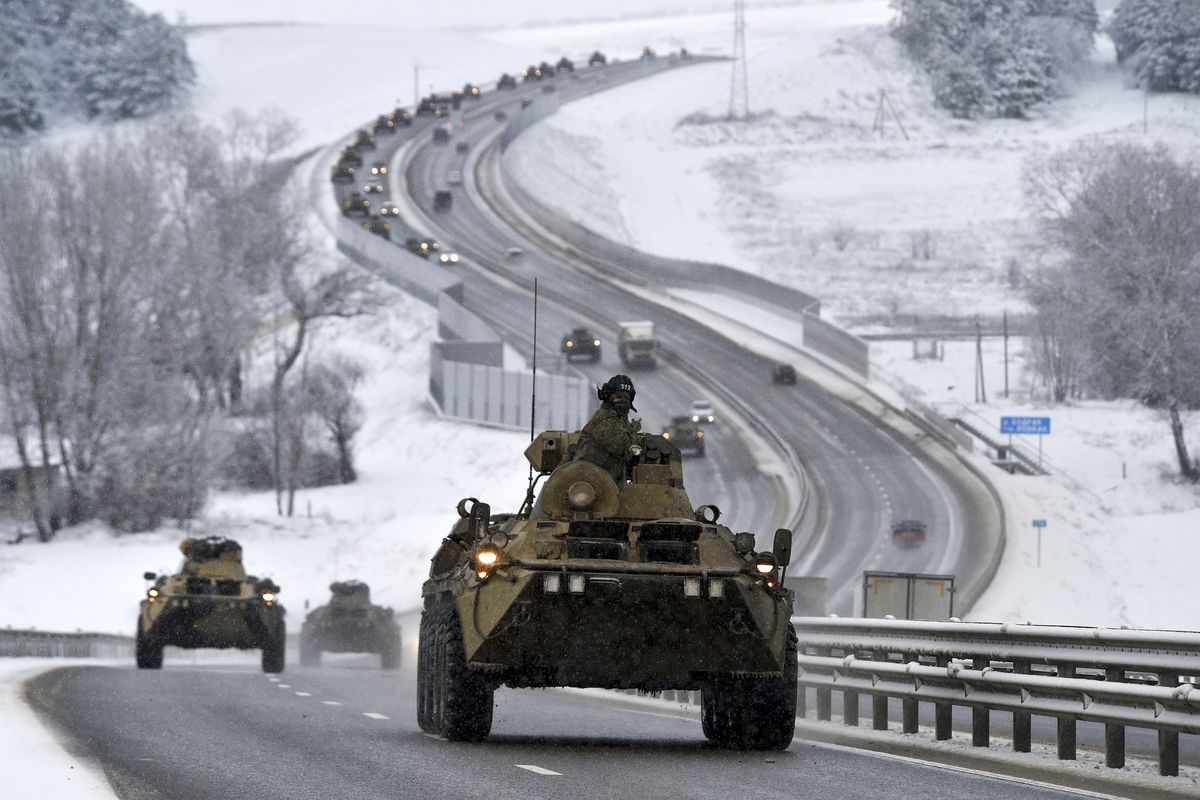The Russo Ukrainian war from the Mauritian perspective has been drawn by Joël Toussaint and Rajen Valayden in a debate that was presented by Ashvin Gudday. Toussaint is an experienced journalist and is actually the chief editor of the independent online newspaper Indocile press. He stressed on the chronological order of events. He claimed that since 2014 an ongoing tension has been happening between Ukraine and Russia and that what is happening today was predictable. He described this war as being one of an imperialist state being threatened in its ‘living space’ and thus reacting just as the US did with countries from Latin America before. This being said Toussaint stressed out the fact that he is neither justifying imperialism nor Russia’s invasion of Ukraine and nor advocating for war. He said that Russia is acting the same as any capitalist imperialist State when they feel that their interests are somehow threatened. He further stated that Ukraine is caught in between NATO’s interest in curbing down Russia’s expansion and Russia’s imperialist vision. He claimed that the war was anticipated by experts. Chain reactions happened as a series of calculated but subliminal wars raged silently between the superpowers later stated Toussaint.
The debate continued with Rajen Valayden, also a journalist and chief editor of the independent online media Capital Mauritius. He depicted a technical view of war. He started by explaining other global conflicts such as the South American conflict and specifically the Cuba conflict. He stated that cumulative retaliations happened and that influential lobbyists in the US played a lot into Cuba’s economic downturn although political will existed to end the embargo.
Rajen shared the view that Ukraine has been manipulated by the North Atlantic Treaty Organization NATO and the west and was made to believe in its adhesion to the European Union and NATO. He later explained that Russia’s aggression over Ukraine is a reaction to the US approach as an imperialist ‘war-mongerer’ State… He spoke of the war economy that goes from weapons production to pharmaceutical and daily stuff like razors.
Propaganda & geopolitical realignment
Toussaint spoke about how the western press agencies influence the perspective of many Mauritians on this war and how some people see the war as a show, comparing bombing to fire crackers. He thus said that the first victim of any war is the truth. For Toussaint misinformation is a well oiled-tool and the lack of analysts in the general press, including Mauritius, only relay the western war propaganda. He elaborated more on this and on how propagandists work in influencing people’s minds. He explained the continuum in the US war journey by five existing women in Biden’s administration, who were already in the US administration before, namely : Michele Flournoy, Janet Yellen, Linda Thomas-Greenfield, Avril Haines and Victoria Nuland. All being in a way or another pro-US war advocates and propagandists. He further explained how some of those officials have triggered Ukraine instability by the overthrowing of the then elected President Yanukovych and how some of those officials have tights with neo-nazists in Ukraine. In underlining those female figures, Toussaint is not being sexist or whatsoever he is pointing out the fact that America is using female leads in respect of quotas and diversity in political representation but that this is only a mirage to mislead public opinions. On the issue of misinformation, Valayden complemented Toussaint’s analysis in saying that one of most important features that NATO and the west gave to Ukraine, apart from weapons, logistics etc. is its propaganda vehicle through the western official press and media. The latter reiterated the fact that no one is justifying Russia’s move over Ukraine, but that the public opinion needs to go beyond western press propaganda and learn about the deep truth. Toussaint further gave the example, to support Valayden’s point, of the French oligarque Bolloré in France, who has been at the center of major controversies and who owns important media in France that influence much public opinion.
Valayden further discussed the real issues of this war which has to do with the progressive weakening of the US and its money versus Putin’s strategy in reinforcement and modernisation of Russia’s army.
The Russia/Ukraine conflict and Mauritius
The intervention of artist and activist from Agalega (the smallest inhabited island that forms part of the Republic of Mauritius) where major infrastructure is being built by India allowed the debate to shift to a more local perspective of the Russia/Ukraine conflict. Both Valayden and Toussaint explored the threat of this war on Mauritius due to military and geo-political agreements between Russia and Soudan in the Indian Ocean as an example. However Toussaint shared the perspective of this war being in fact a Russia/Nato war occuring in Ukraine that is bringing up new dynamics and realignments in the world. Valayden from his side said that the Mauritian government is continuously denying that the major works carried in Agalega has nothing to do with military installations while on the other hand India is proudly saying the contrary in its own country. He said that India’s move in the Indian Ocean, including over Agagela is to counter Chinese influence in the region. Valayden said that all these events should give rise to the demilitarization of the Indian Ocean. He announced the creation of a mouvement named NOW (No war) in that sense. He justified such a demand in a moment where marine biodiversity and ecosystems are under pressure with important maritime activities and that conflicts will only help in worsening the situation and put people’s life and livelihood at risk.
Valayden spoke about the food sovereignty issue as not being dealt with politically by the ruling elite specially in a moment of such important crisis. He denounced the estate property business that is taking a massive amount of the best agricultural land in Mauritius for real estate. He further added that countries with more dire climatic situations than Mauritius have better agricultural yields as compared to Mauritius because they have taken the right measures. As a complement to Valayden’s analysis, Toussaint is of the view that the Mauritian elites have expired, He supported his point with the first lockdown example on the inappropriate measures that were taken by the government with the Chamber of Commerce complicity that totally failed the population. He added that the late measure on limiting oil purchase by consumers is based on same inaccuracy from this elite. Toussaint further explained that at no point has any of the government figures come forward with urgent measures that need to be undertaken to deal with any potential adverse effect of the occuring war. He spoke of the dismantling of agricultural production in Mauritius since the 30 past years and how the biggest of the Mauritian land owners have remained static though the sugar sector is declining. He further explained about the expiration of the elite with the project of petrol production in Mauritius. He said that it is now a known fact that the use of petroleum product is doomed to end by 2036 and that instead of going for new technologies that will be of lesser ecological impact and where major players are heading to, the political elite is digging the grave for an economic catastrophe. On the issue of sovereignty, both Toussaint and Valayden agreed on the necessity of regional cooperation and mutualisation of resources and production for the sake of regional sovereignty.
Agalega prospering with its people.
Arnaud Poulay who is an artist and activist intervened throughout the debate. He talked about economic security, the future and the self-determination of his Island. He also discussed the colonial attitude of Mauritius towards residents who seek health care on the mainland as an example but who are not fully supported by the Mauritian government whilst they are away from their land. He denounced the secrecy of agreements between India and Mauritius in regards to major infrastructure being built in Agalega. He disclosed multiple attempts by the government to limit their rights that give rise to much frustrations amongst the local population. For instance, they were prohibited from animal husbandry. Moreover, the fact they are denied property rights over their land do not create the condition for self-determination. He enumerated a non-exhaustive list of discrimination against the agalean people by the government of Mauritius like in education, in terms of health care and working conditions. Arnaud Poulay spoke about coconut oil production from Agalega that could have contributed to ensuring food sovereignty for the whole republic of Mauritius.
Watch the full debate here:


